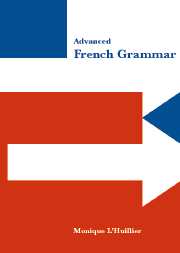Book contents
- Frontmatter
- Contents
- Acknowledgements
- Introduction
- 1 Framework
- 2 Verbs
- 4 Introduction to verbs
- 5 Present indicative
- 6 depuis and other tense markers
- 7 Future
- 8 Imperfect
- 9 Perfect
- 10 Past historic
- 11 Other past tenses
- 12 Subjunctive
- 13 Conditional and the expression of hypothesis
- 14 Imperative
- 15 Infinitive
- 16 Present participle
- 17 Past participle
- 18 Active and passive voices
- 19 Impersonal verbs and the impersonal voice
- 20 Pronominal verbs
- 21 Modals: devoir, pouvoir, vouloir
- 22 savoir and connaître
- 3 Determiners and prepositions
- 4 Nouns, pronouns and modifiers
- 5 Sentences and text
- Appendixes
- Bibliography
- Index
15 - Infinitive
Published online by Cambridge University Press: 05 June 2012
- Frontmatter
- Contents
- Acknowledgements
- Introduction
- 1 Framework
- 2 Verbs
- 4 Introduction to verbs
- 5 Present indicative
- 6 depuis and other tense markers
- 7 Future
- 8 Imperfect
- 9 Perfect
- 10 Past historic
- 11 Other past tenses
- 12 Subjunctive
- 13 Conditional and the expression of hypothesis
- 14 Imperative
- 15 Infinitive
- 16 Present participle
- 17 Past participle
- 18 Active and passive voices
- 19 Impersonal verbs and the impersonal voice
- 20 Pronominal verbs
- 21 Modals: devoir, pouvoir, vouloir
- 22 savoir and connaître
- 3 Determiners and prepositions
- 4 Nouns, pronouns and modifiers
- 5 Sentences and text
- Appendixes
- Bibliography
- Index
Summary
Introduction
The infinitive is a non-temporal and non-personal mood. It is used in dictionaries to give the lexical meaning of the verb, and is given as a basis for the conjugations. It functions both as a verb and as a noun, hence its designation of ‘nominal form of the verb’. The use of the infinitive can be problematic because:
– There is no one-to-one correspondence between an English and a French infinitive, as English often uses a form in ‘-ing’ instead (see also chapter 16 Present Participle, section 3.4).
– There is no one-to-one correspondence between French and English as regards which preposition – if any – to use before the infinitive as a verb.
– There are cases when French can (and sometimes must) use an infinitive clause when English uses a subordinate clause.
– It is a frequent mistake to confuse an infinitive in er with a past participle in ‘é’, as they share the same sound.
NB: In this chapter, examples given concentrate on noun subjects and objects of the infinitive. For further details of the position of pronoun subjects and objects of the infinitive, see chapter 31 Personal Pronouns, section 2.2.3.
Forms
The infinitive has two forms, present and past, which do not have any real temporal value. The present infinitive expresses the non-accomplished aspect, and the past infinitive expresses the accomplished aspect.
The present infinitive
The present infinitive is the usual form of the infinitive.
- Type
- Chapter
- Information
- Advanced French Grammar , pp. 202 - 220Publisher: Cambridge University PressPrint publication year: 1999



